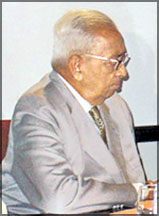Sri Lanka defeats LTTE, time to win over Tamils
Nirmala Ganapathy
A few years ago nobody would have predicted that the civil war in Sri
Lanka would end so dramatically and that LTTE chief V. Prabhakaran would
meet his end at the hands of the Lankan military in the area he had
lorded over for decades.
 |
 |
President
Mahinda Rajapaksa |
Former
High Commissioner
N. N. Jha |
But a number of miscalculations and factors over the years ultimately
led to the demise of the LTTE and Prabhakaran, who by the end lost touch
not only with the ground reality in Sri Lanka but also the international
mood which after 9/11 was unforgiving of terrorism and terror acts.
Many Lanka experts and diplomats believe that the seeds of the rebel
outfit’s demise was sown as early 1991 with the assassination of Rajiv
Gandhi in 1991.
After the assassination, India shut the door on the LTTE and
subsequently followed a hands off approach to the raging civil war in
Lanka while quietly supporting subsequent governments and building up
the Lankan army’s capabilities. It’s no coincidence that the top rung of
the Lankan army was trained in India.
But the tide started to significantly turn in the last couple of
years. In 2002, Prabhakaran believed himself to be at the top of his
game. He successfully presided over a state within a state with full
control over north and east Lanka.
Colombo, tired of the continuing bloodshed, agreed to sit across the
table from the LTTE leadership in peace talks that were to be brokered
by Norway. But after a promising round of talks, the peace process
collapsed as the LTTE continued to demand a separate eelam followed by
increasing ceasefire violations. The talks collapsed and Prabhakaran,
who remained cut off from the world around him, withdrew even further
into his world of alternative realities.
The 2004 tsunami, in which LTTE cadres suffered heavy casualties,
followed by the defection of his trusted aide Karuna, who was the LTTE
commander for the east, hit the Tigers hard. Karuna, who is now a
minister in Rajapaksa’s Cabinet, created his own faction and fought the
LTTE in their own backyard. Fatigue had also set in with the LTTE’s
terror ways even among the Tamils many of whom were targeted by the LTTE.
Elsewhere, the LTTE’s funds were also drying up after EU and Canada
proscribed the LTTE. Even at this stage, the LTTE refused to acknowledge
that international opinion had turned against the revel group and that
the call for eelam had no supporters outside of the Tamil diaspora.
The biggest tactical error that ultimately led to the military defeat
was the LTTE’s refusal to acknowledge the reality that was the Lankan
army. “Their (LTTE) strength was going down even as the Sri Lankan army
had developed into a well-trained force.
Non-recognition of this contributed to the steady decline in their
changes of getting eelam,” said former Indian High Commissioner to Sri
Lanka N. N. Jha.
A majority of the top rung of the Sri Lankan army was trained in
India, which over the years continued to provide non-lethal military
support.
“The LTTE started underestimating the strength of their adversary.
And they started making strategic and tactical errors,” said Prof.
Sahadevan, professor at South Asian Studies at JNU. This led the LTTE to
believe that they could take on the Lankan army while persisting in
their demand for a separate Eelam.
The last but not the least, diplomats and analysts, also say is the
role played by Lankan President Mahinda Rajapaksa, who refused to waver
in the face of international opposition. Sources said that he also
handled the issue diplomatically with the help of China, which ensured
that the Lankan issue never reached the United Nations Security Council.
“This could have been done earlier. It was the absence of requisite
political will and determination to engage. Here for the first time the
political leadership said they would take it to their logical
conclusion. This is the lesson of Sri Lanka. A year ago the entire world
was saying the LTTE could not be defeated,” said Ajai Sahni of the
Institute for Conflict Management.
The Economic Times
|



